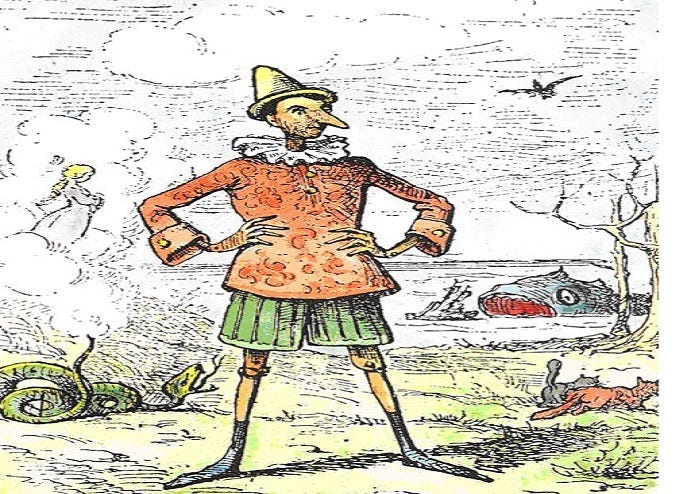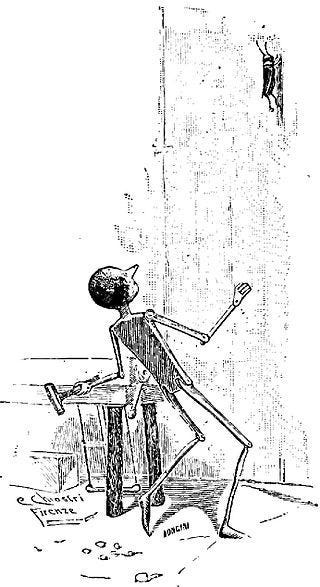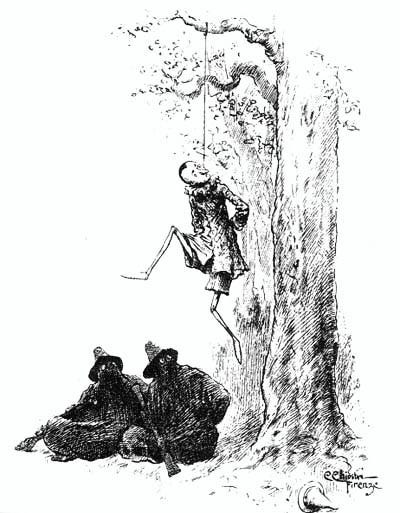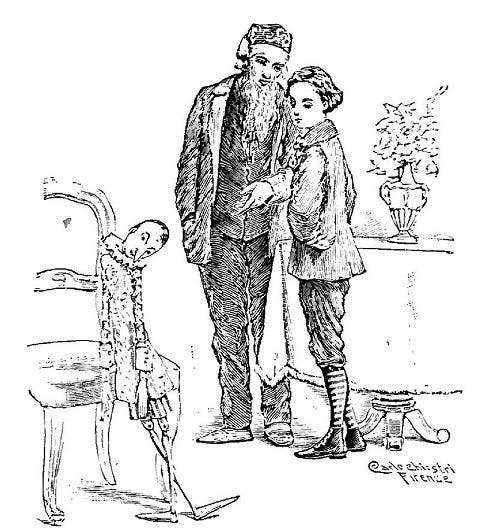The Original Pinocchio Was About The Dangers Of Avoiding Hard Work
It explains how children turn into dummies instead of adults

“At these last words, Pinocchio jumped up in a fury, took a hammer from the bench, and threw it with all his strength at the Talking Cricket. Perhaps he did not think he would strike it. But, sad to relate, my dear children, he did hit the Cricket, straight on its head. With a last weak ‘cri-cri-cri’ the poor Cricket fell from the wall, dead!”
— The Adventures of Pinocchio by Carlo Collodi
You’ve likely noticed an illness that plagues our modern times. It involves aging. But not in a way you’d think. I’m not talking about premature aging, or a physical ailment brought on by biology. It’s more related to psychology.
Some don’t age. While they take on the physical form of an adult, their behavior continues like that of a child. It’s become so noticeable, the word adulting suddenly appeared in our vernacular.
Think about it. There’s a reason why video game sales topped sixty billion dollars in 2021. Society itself even appears to encourage it to a degree.
For many, their call to duty has been replace by Call of Duty. People even sit in front of a computer and play games that simulate work but without the pay and satisfaction at the end of the day.
Although children pushing away nature’s call to become an adult isn’t new, acceptance of adult toddlers is. But fortunately for us, someone left a guide. It’s a handbook for transformation from a child to an adult, and consequences if it’s ignored.
The guidebook is called The Adventures of Pinocchio. Don’t confuse it with the sugar-coated Disney version. The original, written by Carlo Collodi in 1883, is a dark tale of what happens to a dummy that avoids the responsibilities of life.
Moreover, there’s no toned-down sweet message. It contains murder, kidnapping, theft, starvation, and self-imposed misery brought on by poor choices. It also contains lessons that separate adults from children, or marionettes from self-determined humans. These include:
Benefits of adult freedom must be paid for with work and responsibility
Warnings about get rich quick schemes and shortcuts
The dangers of lying
How friendships with bad people can put you in terrible situations
The Pinocchio character isn’t even likeable during most of the book. He has a compulsion to do the wrong thing — including everything listed above — and never learns from his mistakes till the very end. He’s a cricket-murdering delinquent that gets his father tossed in jail for a fake child abuse claim.
Despite the mayhem, there is a happy ending very relevant to the modern day. But we need to experience pain with Pinocchio first.
Adult Freedom Equals Work And Responsibility
“‘Shall I tell you something?’ asked Pinocchio, who was beginning to lose patience. ‘Of all the trades in the world, there is only one that really suits me…That of eating, drinking, sleeping, playing, and wandering around from morning till night.’ ‘Let me tell you, for your own good, Pinocchio,’ said the Talking Cricket … ‘that those who follow that trade always end up in the hospital or in prison…Poor Pinocchio, I am sorry for you…Because you are a Marionette and, what is much worse, you have a wooden head.’
— The Adventures of Pinocchio by Carlo Collodi
From the minute Pinocchio is carved by his father Geppetto, he’s in trouble. He insults the carver as soon as he has a mouth and steals the old man’s wig after hands are created. Once Geppetto makes Pinocchio legs, he runs away.
A policeman grabs the puppet and returns him to Geppetto. But after the old man threatens to discipline him and Pinocchio cries, villagers intervene. The policeman now arrests Geppetto as an abuser.
The puppet now praises his newfound freedom with no responsibility. After a warning by the Cricket, Pinocchio kills him. He then realizes he’s hungry but has no food or money. He wanders in the night through a rainstorm finding nothing to eat.

He returns home, falls asleep by the fire and his feet burn off. Fortunately, Geppetto is released. The kind old man feeds the puppet and fixes his feet. Pinocchio appears to learn a lesson, but not really.
The old man sells his coat in the middle of winter to buy the puppet a book so he can go to school. But Pinocchio sells it for tickets to a show and almost gets tossed in a fire, barely escaping with five gold coins.
This cycle continually repeats. Pinocchio goes out of his way to avoid work or study and almost dies and starves to death. At one point he finds himself in the Land of Busy Bees, where everyone works diligently. The puppet notes:
“‘I understand,’ said Pinocchio at once wearily, ‘this is no place for me! I was not born for work.’”
Hungry, he resorts to begging. The citizens give him many chances to work to buy food. But he insults them. Eventually a man pulling a coal cart tells him, “Then, my boy, if you are really faint with hunger, eat two slices of your pride; and I hope they don’t give you indigestion.”
But his aversion to work also pushes him towards quick money-making schemes.
Dangers Of Shortcuts And Get Rich Quick Schemes
“I am laughing at those simpletons who believe everything they hear and who allow themselves to be caught so easily in the traps set for them…I have reached the conclusion that, in order to come by money honestly, one must work and know how to earn it with hand or brain.”
— Parrot addresses Pinocchio, The Adventures of Pinocchio by Carlo Collodi
After Pinocchio’s disaster with the puppet show. He resolves himself to make better decisions. He’ll take the gold coins, then buy his father a coat, and repurchase the book he callously sold off. But he meets a shady cat and fox on the way home.
They tell Pinocchio he can grow his five coins to two-thousand if he buries them in the ground of a town called Simple Simon. The puppet falls for the con. The cat and fox trick him into buying them dinner at an inn and plan to set out in the middle of the night. But the animals leave before Pinocchio awakes.
Many, including the ghost of the Cricket, warn him about assassins on the path. But the puppet ignores them. He’s soon chased by dark figures, which speak like the cat and fox. They try and stab Pinocchio, but he has wooden skin. So, the assassins resolve to hang him till he’s dead.

After being saved by a kind Fairy, she offers to adopt the puppet, and take in his father as well. But stunningly Pinocchio goes off with the cat and fox again to bury the gold coins. He’s robbed and ends up doing a stint in prison.
He again repeats the process. After finding success in school, a lazy friend named Lamp-Wick talks him into running away to the Land of Toys, where one can play all day, never work, and avoid school. This again results in disaster.
Then, there’s his penchant for lying.
Dangers Of Lying
“Lies, my boy, are known in a moment. There are two kinds of lies, lies with short legs and lies with long noses. Yours, just now, happen to have long noses.”
— Fairy addresses Pinocchio, The Adventures of Pinocchio by Carlo Collodi
Like the Disney version, Collodi’s Pinocchio continually lies to cover his bad behavior. Like the real world, they come back to bite him, but with a physical manifestation of a growing nose. The long nose gets him physically stuck.
So, like the real world, lies can get you trapped within their walls, removing your ability to navigate freely. His choice of friends also hamstrings him.
Dangers Of A Bad Crowd
“The teacher warned him each day, and even the good Fairy repeated to him many times: ‘Take care, Pinocchio! Those bad companions will sooner or later make you lose your love for study. Some day they will lead you astray.’”
— The Adventures of Pinocchio by Carlo Collodi
Repeatedly the puppet is warned to keep away from people who don’t have his best intentions in mind. However, he continually runs away with bad characters from school. In one instance, he gets into a fight with a gang of them and a child is almost killed.
Pinocchio has to escape from the police at this point.
Despite lucking out and getting on the straight-and-narrow once again, Lamp-Wick talks him into ditching school and the safe home with his adoptive mother, the Fairy. He ends up in the arms of a human trafficker.
Despite many warnings, he runs off to the Land of Toys and turns into a donkey. A shady carriage driver sells him off to a circus. He’s later almost killed when someone tries to drown him in the sea, so they can turn his donkey hide into a drum cover.
Believe it or not, there is a happy ending.
Transformation Of Puppet To String-Free Individual
“‘But you can’t grow,’ answered the Fairy… ‘Because Marionettes never grow. They are born Marionettes, they live Marionettes, and they die Marionettes.’ ‘Oh, I’m tired of always being a Marionette!’ cried Pinocchio disgustedly. ‘It’s about time for me to grow into a man as everyone else does.’”
— The Adventures of Pinocchio by Carlo Collodi
After a reunion with the Fairy, Pinocchio sees she’s grown older. He wants to grow too, but his adoptive mother points out it’s impossible because the puppet can’t even master the skills of a proper child, let alone an adult. This is the entire point of Pinocchio being a puppet.
A marionette is controlled with strings by another. By not working, studying, and building himself into something better, he’s someone else’s puppet. His strings also pull back on his family and loved ones, as he screws up.
Towards the end of the story, Pinocchio recovers and takes care of his father, getting two jobs to earn money. He also raises money for his adoptive mother who takes ill. While doing this, he studies at night.

It’s at this point he transforms into a young man. Not by magic, but through work and responsibility.
This is what makes the 1883 story so relevant today in our adulting modern times.
It shows the pain of being a marionette, or an adult toddler.
Adult freedoms come with adult responsibilities.
Many shortcuts are scams.
Lies trap you in places you don’t want to be.
Bad friends bring you down with them.
It’s also never too late to work on improving your life
Finally, it doesn’t sugarcoat the pain caused by bad decisions. In fact, during one of his jobs, Pinocchio finds Lamp-Wick turned into a donkey and dying due to exhaustion. Fortunately, the puppet changed before it got to that point. Modern marionettes can too.
Originally posted on Medium 6/2/22


